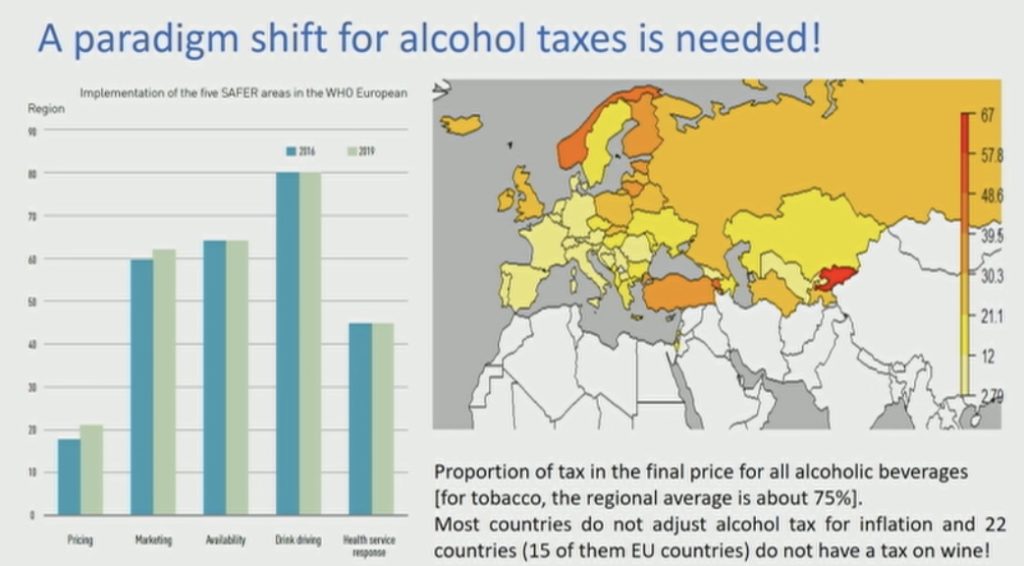Alcohol policy and the SAFER WHO European Region initiative took center stage at the WHO Europe Regional Committee Meeting, the highest decision-making body of the 53 Member States of the WHO European Region. It was a high-level event with participants such as the Scottish Prime Minister, the Russian Minister and Deputy Minister of Health, and the Czech and Slovenian Ministries of Health as well as representatives from civil society and academia.
I was invited to contribute to the discussion of the way towards a SAFER European region. The moderator, Prof. Ilona Kickbusch, asked me the following question:
From the perspective of civil society, what would you say should be the number one action that should be prioritised by Member States working together to achieve a WHO European Region, free from harm due to alcohol?
Prof. Ilona Kickbusch, Director, Global Health Centre, Graduate Institute of International and Development Studies, Geneva
The event highlighted the huge gap between evidence and policy action in the European Region.
Prof. Jürgen Rehm, set the scene by talking about what the solutions are that work and what the challenges and opportunities are that have arisen with COVID-19.
In his presentation, he showed that alcohol pricing policies, such as alcohol taxation, are the least used alcohol policy solution, despite the heavy alcohol burden and their proven effectiveness.
He highlighted the need for a “paradigm shift” towards alcohol taxation.
The interventions by health leaders from across the region clearly emphasized the need to scale up the implementation of relevant measures in order to prevent alcohol harms and achieve better health, economic and COVID-19 recovery outcomes.
Scotland’s First Minister Nicola Sturgeon, for instance, emphasized that alcohol pricing policies should be the core of a comprehensive strategy to address the harm caused by alcohol products.
This message was recently underpinned by a new study, showing that doubling current alcohol excise taxes in the WHO European region could avoid almost 6% of new cancer cases and cancer deaths caused by alcohol (180,900 cases and 85,100 deaths) in the region.
The number one priority action

Of course, we would need to talk about three, four important priority actions that are crucial to prevent and reduce alcohol harm in the European region, not just one as Prof. Kickbusch asked for. One of these priority solutions should for example be alcohol retail monopolies. The European region already has great experience and very good evidence showing how effective and important this measure is. By removing the profit interest from alcohol retail, countries can effectively protect people from the harms caused by the products and practices of the alcohol industry.
Joint initiative for alcohol taxation
But if I had only one Christmas wish, for immediate action, I would start with something that is realistic to implement right away and that is still ambitious in its impact on lives saved.
We need a regional joint initiative for public health-oriented alcohol taxation.”
Kristina Sperkova
We need a regional joint initiative for public health-oriented alcohol taxation. The COVID-19 pandemic has brought into sharp focus that there is an urgent need to use the most effective tools to prevent and reduce alcohol harm, to strengthen health systems and promote health, and to raise domestic resources. And alcohol taxation will help to prevent deaths and reduce harms, mobilize more government revenue, enable healthcare improvements and reduce inequalities.
We need a joint regional initiative to advance alcohol taxation. That way we would avoid the cross-border issues we see for example in Baltic states. International institutions such as the WHO, the OECD, and the World Bank, need to come together in support of countries to build capacity to implement public health-oriented alcohol taxes. Increasing technical capacity includes a whole-of-government approach where ministries of health and finance work together, understanding the return on investment in public health oriented alcohol excise taxation. This initiative is also about building a clear and well-functioning infrastructure. For example, a Ministerial Conference, where leaders come together, discuss common issues of concern and chart the way forward.
The barrier to progress
People want change. People want to live in healthy communities. They do not want to subsidize the profits of Big Alcohol.”
Kristina Sperkova
Of course, there is a reason why alcohol has become more affordable in the last decade and why the single most effective alcohol policy solution is neglected: alcohol industry interference. What it does is, that alcohol policy is not approached from a public health imperative but from the profit maximization imperative of the alcohol industry.
To protect alcohol policy development in a much better and more effective way, why we also need stronger tools for national action and international collaboration, going forward.
Towards a global binding treaty
We need a Global Binding Treaty on Alcohol that puts the human right to health in the center of alcohol policy making and that facilitates much stronger protection against conflicts of interest and alcohol industry interference.
These two solutions – a joint alcohol taxation initiative and work towards a global binding treaty – are not revolutionary ideas. They exist for other public health issues.”
Kristina Sperkova
These two solutions – a joint alcohol taxation initiative and work towards a global binding treaty – are not revolutionary ideas. They exist for other public health issues. And alcohol harm is a public health priority, as WHO member states have called it. And therefore, the response to alcohol harm needs to reflect the urgency and magnitude of the problem.
In Movendi International, we know that this matters and we see the potential to make a real difference in our communities. Our members work every day across the region, and the world, and face the harm caused by the products and practices of the alcohol industry.
Whenever we talk about solutions that are available (like taxation, like approaching the alcohol industry the same way as the tobacco industry), it makes sense to people and they express support. People want change. People want to live in healthy communities, protected from avoidable threats to the well-being of their kids and families. People want well-functioning healthcare. They do not want to subsidize the profits of Big Alcohol.
So what we need is leadership on the solutions, that scare the alcohol industry but protect and benefit the people.
I am convinced that the joint alcohol taxation initiative is the priority action to take now. It facilitates concerted action and stronger political commitment. It helps to mobilize greater engagement of public health-oriented nongovernmental organizations, professional associations and civil society groups. And it is an essential step forward towards more effectively protecting people, including the most vulnerable communities, from the harms caused by the alcohol industry.

